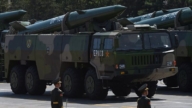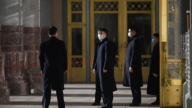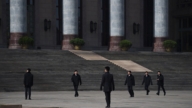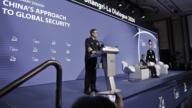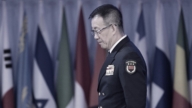【新唐人2013年01月02日讯】一系列中共高官被国外媒体爆出亲属获取商业暴利后,日前,《纽约时报》又曝光前任“中国人民银行”行长戴相龙家人钱权交易内幕。戴相龙亲属所投资的公司,以极低的价格大量购入“中国平安保险”股份,获取暴利。专家指出,目前曝光出来的中共官员贪腐案件只是冰山一角,日后还会有更多高官的巨额财富呈现出来。
《纽约时报》在一篇题为“平安保险崛起,金融管控高官家族大获其利”的报导中指出,戴相龙的女婿车丰及亲属掌控的“鼎和创业投资公司”,于2002年以5500万美元购入“中国平安保险”股票,到2007年股价已达到31亿美元。“鼎和创业”买下“平安保险”后,使不应该拥有金融权的“平安保险”免于拆分,继续保有信托部门,2004年“平安保险”还得以在香港公开对外售股,目前,公司资产高达650亿美元。
“中国平安保险”是目前中国保险业的龙头企业,根据公司官方网站显示,其中寿险和保险产业位居中国第二。
经济时政评论专家草庵指出,戴相龙当时作为中共金融业的最高主管,在“平安保险”面临分拆时,具有生杀大权,而“鼎和创业”买下“平安保险”的股份,也正是在戴相龙的管辖范围之内。
经济时政评论家草庵居士:“这个事情都可以明显的看出,中共内部的钱权交易是跌破了底线,今天你揭露了戴相龙,事实上我们在未来的不久可以看到更多的官员卷入到这些案子,实际上中国有很多上巿公司、很多证券公司,都会涉及到这些人,他们这些内部的钱权交易只是冰山中的一角。”
《纽约时报》报导指称,鼎和创业公司的结构复杂,车丰和他的友人是可以透过组织架构有效掌管“鼎和”。有记录显示,车丰甚至于2006至2009年担任“平安保险”监理会成员。
《纽约时报》的调查发现,除购入平安保险股份外,鼎和创业公司于同年还购入“海通证券”大量股份,2007年“鼎和”持股金额高达10亿美元。而戴相龙的妻子柯永真则在2007年至2010年间,担任“海通公司”监理会会长。
草庵说,中国官员贪污的手段五花八门,很多通过亲属进行,官员则藏在后面操纵。草庵还表示,像戴相龙的事情,很多人都知道,只是人们不敢也不能去揭开,否则面临被打压甚至有牢狱之灾。
经济时政评论家草庵居士:“在中国党政不分,钱权交易严重,它没有一个独立的司法制度去监督,另外它没有一个公正、公平、独立的新闻机构,在海外这种事情,它往往有一个独立的司法机构,一个独立的新闻监督机构,当你发生这个事情它就很快曝光出来。”
《纽约时报》这篇由驻上海记者张大卫(David Barboza)撰写的报导,再次把矛头指向中共总理温家宝。报导说,“中国平安保险公司”主席马明哲,直接向当时的国务院副总理温家宝,和“中国人民银行”行长戴相龙发出呼吁,要求政府放宽对平安保险公司实施大型金融公司分割的规定。
《纽约时报》其他系列报导说,在“鼎和”买下“平安保险”股份的同一天,天津“泰鸿公司”也以极低价格买下“平保”大量股份,而温家宝的母亲杨志云于2007年持有总值1.2亿美元的“平保”股票,这些股票就是登记在“泰鸿公司”的名下。
中共外交部发言人曾指责《纽约时报》关于温家宝家人资产的报导是抹黑。星期一,《纽约时报》驻北京记者储百亮,由于签证没有获得延期而不得不离开中国。
《彭博通讯社》半年前(2012年6月)曾报导习近平旁系亲属打造的商业王国。几天前,又详细报导了中共八大元老的子女和孙辈如何控制中国的财富。
《彭博通讯社》的网站目前被中共屏蔽。
采访编辑/刘惠 后制/陈建铭
US Media Unveiled More Power-for-Money Deal in China
A series of news reports have unveiled how relatives
of senior Chinese Communist Party (CCP) officials have reaped vast fortunes.
Recently, the New York Times disclosed power-for-money
deals among the family members of Dai Xianglong,
former president of the People’s Bank of China.
A company controlled by Dai’s relatives paid very low
prices to acquire large stakes in China Ping An Insurance.
This reaped huge profits.
Critics indicate that exposing this CCP officials
corruption scandal is just the tip of the iceberg.
In addition, huge weath amassed by other senior
CCP officials is expected to surface in the near future.
The New York Times’ article reported in 2002 on Dinghe
Venture Capital, a company controlled by Che Feng,
son-in-law of senior CCP official Dai Xianglong.
Che Fang, along with other relatives bought a large
stake in Ping An Insurance for US$55 Million.
By 2007, these shares were worth US$3.1 Billion.
The investment by Dinghe helped Ping An Insurance
avoid breaking up, and thus retain its trust division.
In 2004, Ping An Insurance was listed in Hong Kong,
which, today, is worth around US$65 Billion.
Ping An Insurance is China’s leading insurance company.
Both its life insurance and property and casualty
insurances businesses are ranked second in China.
This is in terms of its premium income.
Economics critic Cao An says that at the time,
Dai Xianglong was top CCP financial chief.
Ping An was facing a situation that would require a breakup.
Dinghe’s investment in Ping An is within Dai’s jurisdiction.
Cao An: “This case shows that CCP’s power-for-money
deals have sunk to below the bottom moral line.
Today it has exposed Dai Xianglong to public.
In the near future, we’ll see more
officials implicated in similar cases.
In fact, lots of security firms and listed companies
in China are all involved with these officials.
But these power-for-money deals
are still just the tip of the iceberg.”
The NY Times’ article says that Che Feng
and his business partners “set up a complex
web of companies” to control Dinghe.
The records show that Che Feng was “nominated to serve
on the Ping An board of supervisors from 2006 to 2009”.
The NY Times found that in 2002, Dinghe also
acquired a large stake in Haitong Securities,
which were worth about US$1 Billion by 2007.
“Later, between 2007 and 2010, Dai’s wife, Ke Yongzhen,
was chairwoman on Haitong’s board of supervisors.”
Cao An remarks that CCP officials have
used all sorts of means in their corruption.
Usually, officials hide backstage manipulating
their relatives who appear in public.
Cao An adds that many people know similar cases
to that of Dai’s, which they dare not and cannot disclose.
Otherwise, they will risk suppression and even jail terms.
Cao An: “In China, there’s no separation between the Party
and government, but has serious power for money deals.
There’s no independent judiciary to supervise the CCP.
Neither has it a just and independent media watchdog.
Overseas, a democratic country has an
independent judiciary, and a media watchdog.
So usually, such a thing can be disclosed when it happens.”
The NY Times’ article, authored by David Barboza,
once again directed criticism at CCP premier Wen Jiabao.
It says that Ma Mingzhe, chairman of Ping An, “pleaded
with Mr. Dai to approve an overseas stock offering in 1998.”
It says, “It would be rather difficult to raise such
a huge amount of money in the domestic market.”
The New York Times reported that like Dinghe,
the Tianji-based company Taihong also has
a large stake in Ping An for extremely good prices.
Reportedly, Wen Jiabao’s mother Yang Zhiyun
held Ping An shares worth US$ 0.12 billion in 2007.
These were registered in Taihong’s name.
In the past, CCP Foreign Ministry spokesman criticized the
New York Times coverage on Wen Jiabao’s family assets.
On December 31, Chris Buckley, the New York
Times reporter in Beijing had to leave China.
This is for having failed to get a visa extension.
In June 2012, the Bloomberg reported on business
empires built by Xi Jinping’s collateral relatives.
Days ago, the news agency reported in detail on how
offspring of eight CCP veterans control China’s wealth.
The Bloomberg site has been blocked
from being browsed in China.


